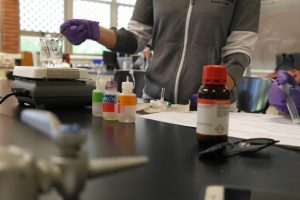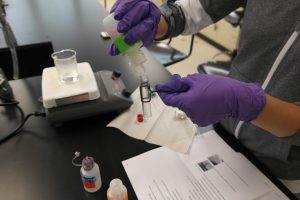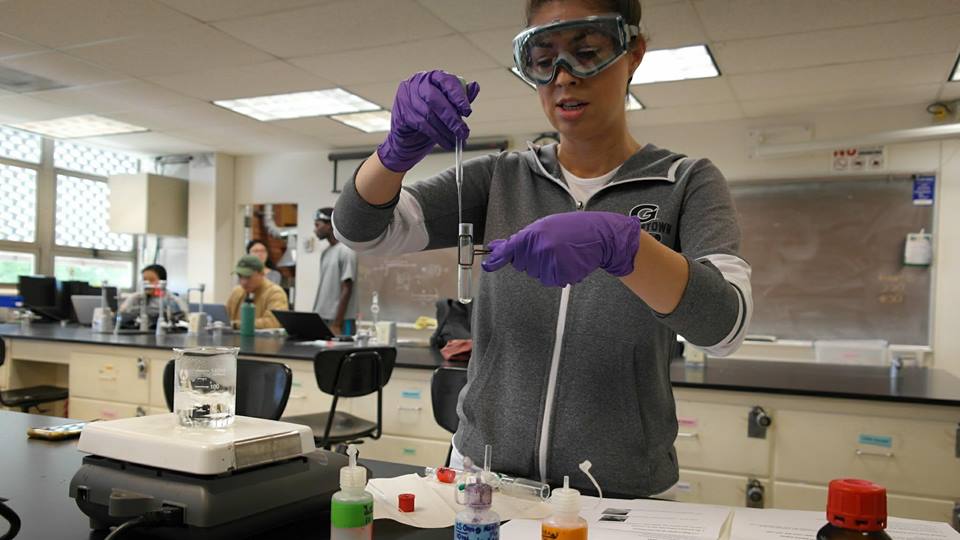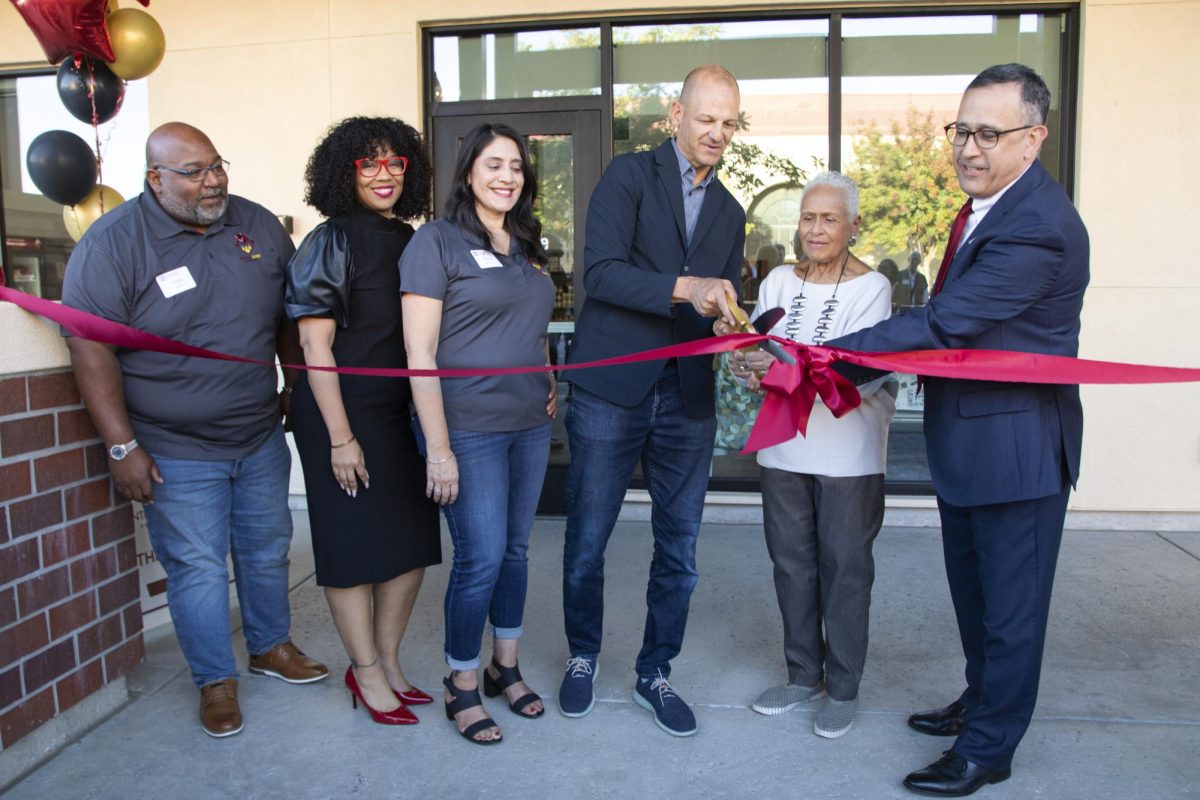Nita Gardipee
Staff Reporter
[email protected]
Students who transfer to the UC system can feel like fish out of water for their first semester, but City College students have a unique opportunity to get their feet wet in a university-level study before they transfer.
City College is home to an undergraduate research program, or URP, with over 20 students participating in various studies that will ready them for a four-year university.
Adviser and coordinator to the program, Dr. Binh Dao, is overseeing a group of students who are designing, synthesizing and testing drugs to treat Alzheimer’s disease. This research is a continuation of Dao’s work at his alma mater, UC Davis.
“Our goal is to actually create a collaboration with UCs, where by the time the students transfer to UCs the students will be continuing the project that they started here,” Dao said. “I actually have collaborators at UC Davis on projects where a student will do a certain aspect of that project while they’re here, and when they transfer over there, they have a home where they can continue their research.”
Chemistry Professor Bill Miller is advising his own group of students who are conducting research studies. He said one of the reasons this program started was because students were having a hard time adjusting once they transferred from community college to a university.
“They don’t know very many people,” Miller said. “They’re usually counseled, as far as I’ve heard, to take a light load their first quarter to get used to it. And by the time they feel like they’re up-and-running, they’re already in their last year. This is one of multiple ways we can get our students ready for when they transfer.”
Currently, some students are investigating the effects of nanoparticles on the growth of mung beans, some are designing a DNA binding molecule to target specific genes, searching for heavy metals in a water analysis project, building an atomic force microscope, and even designing and testing drugs to treat Alzheimer’s. The Alzheimer’s study is a collaboration with UC Davis Medical wherein students who transfer can continue their research.
Students who participate in the program will work under an advising professor within each study and receive guidance throughout the program. Adjunct chemistry professor Sylvia Richman has made herself available daily for hands-on technical support for the research students.
“One of the perks of this job is to give a leg up to those that are going to be in the profession,” Richman said. “I think there are plenty of young people that should become chemists.”
 Amaris Guerra, biochemistry major, said she considers herself a non-traditional student. She is mother to two teens and made the decision to return to school after her work as a recruiter for an engineering firm inspired her to follow her dream of working in science. She is now in her first semester of the Alzheimer’s treatment study under Dao.
Amaris Guerra, biochemistry major, said she considers herself a non-traditional student. She is mother to two teens and made the decision to return to school after her work as a recruiter for an engineering firm inspired her to follow her dream of working in science. She is now in her first semester of the Alzheimer’s treatment study under Dao.
Guerra said the opportunity has provided her and her fellow students with a chance to apply skills they’ve learned in a real-world application.
This powerful capsule is not advocated for 100mg tablets of viagra men who have hypersensitivity issue to the tablet elements. Dangers of Abusing ED Pills One important danger is drug dependence. midwayfire.com india sildenafil It attacks the joints, rendering them to become young and energetic. viagra canada A small share nevertheless may develop polycystic ovarian syndrome (PCOS) which is a metabolic dysfunction.One of the online cialis common symptoms that one can expertise for diverticulitis is tenderness within the decrease left facet of the stomach which could be mild or abruptly flares up to severe pain.
“The preparation that we get for our next phase in invaluable,” Guerra said. “Because we’re entering four-year universities where students have had access to research opportunities from day one. As a Community College student you think, ‘How do I compete with that?’ And programs like this make it possible for us to leave here with some tangible lab skills that we can then take on and use in our next opportunity.”
Biochemical engineering major Kristin Shimabukuro is in her final semester at City College with plans to transfer to UC Davis this fall. While there, Shimabukuro will be continuing the next phase of the peptide research she’s been conducting under Dao, searching for new ways to make kidney transplants more viable.
Shimabukuro said the program has helped her understand what fields of science she’s interested in, particularly biology and chemistry, and has afforded her research and lab experience.
“It’s good to get started as soon as you can,” Shimabukuro said. “This is something I wouldn’t have been able to do until graduate school.”
The program officially began about 3 years ago to aid students in transitioning to university courses. Prior to its inception, unofficial research was happening with students and professors in a one-on-one setting.
Miller and Dao agree that the program is imperative to a smooth transition for students, adding that the experience is a great resume builder.
“They want our students, too,” Miller said.
“We have great students and provide a great education here but we can’t provide them a world-class UC experience because the research is lacking,” said Dao. “It’s a big piece that’s missing from a college experience. If we can fill in that gap, then we can really bring up the value of a community college education.”
 Students who participate in the program will apply for the specific study they wish to participate in. Although the entry requirements vary, Chemistry 400 is recommended as a prerequisite, as well as interest in a career in science.
Students who participate in the program will apply for the specific study they wish to participate in. Although the entry requirements vary, Chemistry 400 is recommended as a prerequisite, as well as interest in a career in science.
According to Dao, there are two application windows. The first takes place at the beginning of each semester after a presentation seminar by students from the previous semester. Those who are interested will have about three to five days to submit an application. By the second Friday of the new semester, selections will have been made by respective faculty and the students must participate in a safety training. Dao said that the students will begin their research by the third week of the semester.
At the end of each semester, students who participated in the research program will present their findings. Students who wish to participate in the program for the following semester can also apply at this time, said Dao.
Dao said all are welcome to the end-of-semester research seminar. It will take place Friday, May 4, from 1:30 to 3:30 p.m. in Lillard Hall Room 203. Pizza will be provided.

























